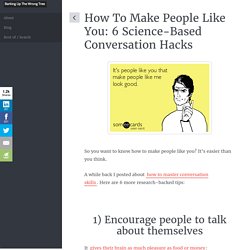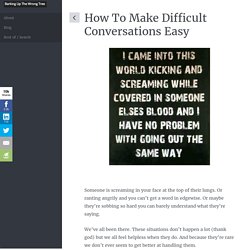

How confident should you be at work today? Moderately overconfident.

Being slightly delusional is a good thing here. You’ll choose more challenging tasks and this study shows it’s an advantageous attitude to have. But don’t be extremely overconfident: People use information about their ability to choose tasks. If more challenging tasks provide more accurate information about ability, people who care about and who are risk averse over their perception of their own ability will choose tasks that are not sufficiently challenging. Source: “A Model of Overconfidence” from IZA Discussion Paper No. 4285, July 2009 It’ll increase your productivity: Recent studies report that productivity increases under tournament reward structures than under piece rate reward structures.
Source: “Overconfidence Increases Productivity” from ISER Discussion Paper #0814. But will this hurt you in terms of teamwork? We use a laboratory experiment to study how perceptions of skill influence teamwork. Join 25K+ readers. Would introverts be better off if they acted more like extraverts? Yes: People enjoy acting extraverted, and this seems to apply equally across the dispositional introversion-extraversion dimension (Fleeson, Malanos, & Achille, 2002).

It follows that dispositional introverts might improve their happiness by acting more extraverted, yet little research has examined potential costs of this strategy. In two studies, we assessed dispositions, randomly assigned participants to act introverted or extraverted, and examined costs—both emotional (concurrent negative affect) and cognitive (Stroop performance).
Results replicated and extended past findings suggesting that acting extraverted produces hedonic benefits regardless of disposition. Positive affect increased and negative affect did not, even for participants acting out of character. Source: “Would introverts be better off if they acted more like extraverts? Join 25K+ readers. 6 Hostage Negotiation Techniques That Will Get You What You Want. How does hostage negotiation get people to change their minds?

The Behavioral Change Stairway Model was developed by the FBI’s hostage negotiation unit, and it shows the 5 steps to getting someone else to see your point of view and change what they’re doing. It’s not something that only works with barricaded criminals wielding assault rifles — it applies to most any form of disagreement. There are five steps: Active Listening: Listen to their side and make them aware you’re listening.Empathy: You get an understanding of where they’re coming from and how they feel.Rapport: Empathy is what you feel. Rapport is when they feel it back. The problem is, you’re probably screwing it up. What you’re doing wrong In all likelihood you usually skip the first three steps. And that never works. How To Make People Like You: 6 Science-Based Conversation Hacks.
So you want to know how to make people like you?

It’s easier than you think. A while back I posted about how to master conversation skills. Here are 6 more research-backed tips: 1) Encourage people to talk about themselves It gives their brain as much pleasure as food or money: Talking about ourselves—whether in a personal conversation or through social media sites like Facebook and Twitter—triggers the same sensation of pleasure in the brain as food or money, researchers reported Monday…“Self-disclosure is extra rewarding,” said Harvard neuroscientist Diana Tamir, who conducted the experiments with Harvard colleague Jason Mitchell. 2) To Give Feedback, Ask Questions If you use questions to guide people toward the errors in their thinking process and allow them to come up with the solution themselves, they’re less likely to feel threatened and more likely to follow through. Via Your Brain at Work: Strategies for Overcoming Distraction, Regaining Focus, and Working Smarter All Day Long:
How To Make Difficult Conversations Easy: 7 Steps From A Clinical Psychologist. Someone is screaming in your face at the top of their lungs.

Or ranting angrily and you can’t get a word in edgewise. Or maybe they’re sobbing so hard you can barely understand what they’re saying. We’ve all been there. These situations don’t happen a lot (thank god) but we all feel helpless when they do. And because they’re rare we don’t ever seem to get better at handling them. Problem is, these moments are often critical because they’re usually with people we care about. How To Get People To Like You: 7 Ways From An FBI Behavior Expert. Before we commence with the festivities, I wanted to thank everyone for helping my first book become a Wall Street Journal bestseller.

To check it out, click here. Meeting new people can be awkward. What should you say? How can you make a good impression? How do you keep a conversation going? Research shows relationships are vital to happiness and networking is the key to getting jobs and building a fulfilling career. But what’s the best way to build rapport and create trust? Robin Dreeke can. Robin was head of the FBI’s Behavioral Analysis Program and has studied interpersonal relations for over 27 years. Robin is the author of the excellent book, It’s Not All About “Me”: The Top Ten Techniques for Building Quick Rapport with Anyone. I gave him a call to get some answers.